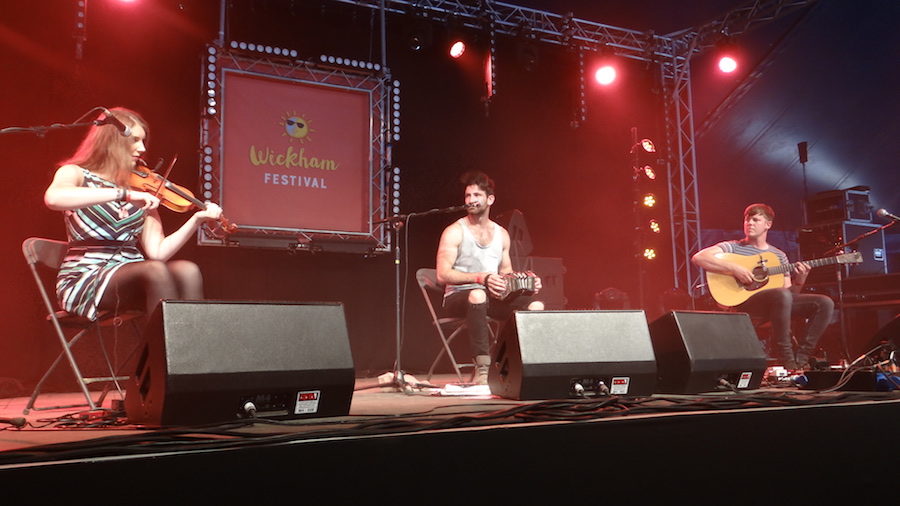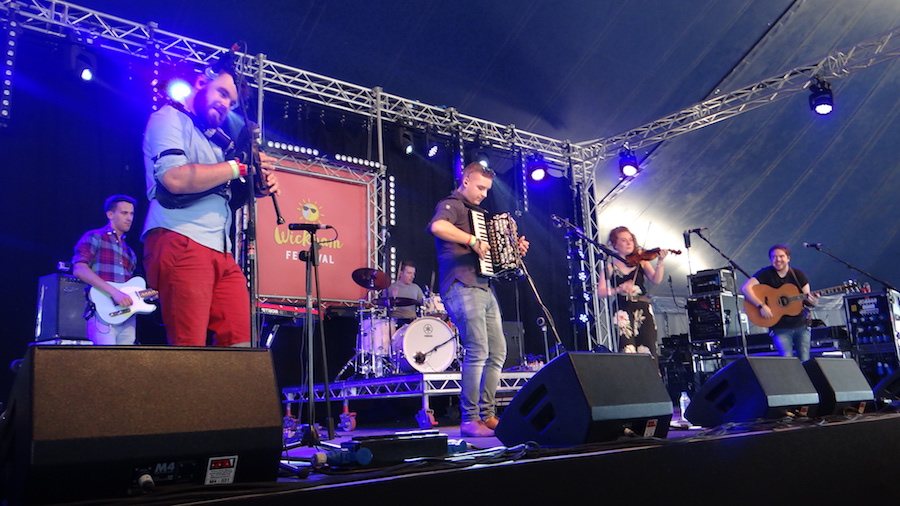Johnny Whalley continues his live review of this year’s Wickham Festival taking in some of the highlights of the weekend including Vishtèn, Ímar, Talisk, The East Pointers, Gordie MacKeeman, The Dhol Foundation, Hò-Rò, Flook, Bella Gaffney and Polly Bolton, Drever, McCusker and Woomble and more (Read Part 1 here).
19:30 on the first evening and we’d already experienced a jaw-dropping set from an outstanding band. Vishtèn are sisters Pastelle and Emmanuelle LeBlanc from Canada’s Prince Edward Island and Pascal Miousse from the tiny Magdalen Islands, a mere four-hour ferry trip from PEI. The names declare their French-speaking roots, roots that are in the Acadian tradition. These give the music a distinctively different style when compared to the Québécois sound more commonly heard in the UK over recent years. An infectious foot-tapping accompaniment, podorythmie, is common to the two traditions and from the outset, it was bursts of this insistent percussion that had the crowd moving and, before long, dancing. True multi-instrumentalists, fiddle, mandolin, octave mandolin, guitars, piano accordion, piano, bodhrán and jaw harp are in their armoury and used to great effect on traditional tunes, their own compositions and as an accompaniment to the vocals that all three share. The songs are mostly their adaptations of traditional Acadian songs and stories though connections between Acadia and the French speakers of Louisiana emerge and give the music an occasional Cajun edge. The band have a new album, Horizons. Its UK release will be January/February next year when they’ll have a UK tour. Keep a lookout; their music is not to be missed either live or recorded.
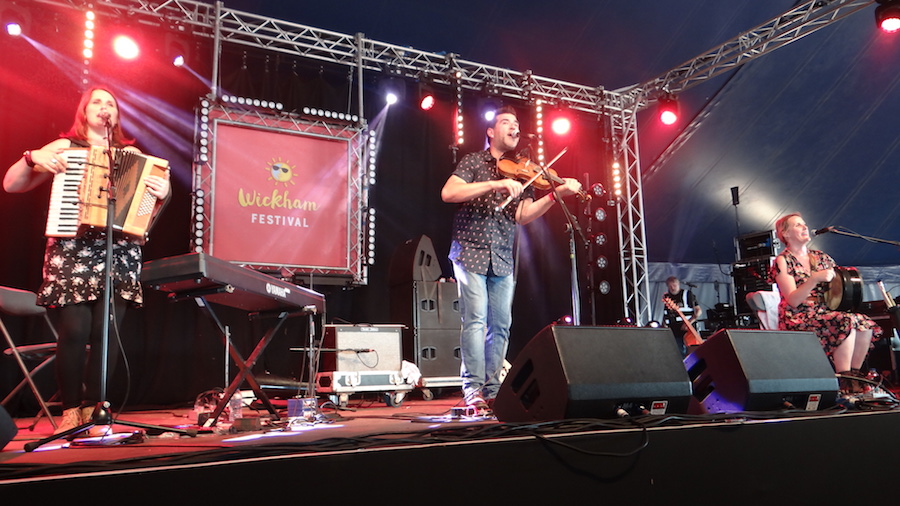
Vishtèn
As Vishtèn closed their set on The Village Stage, the five-piece band, Ímar, were already raising the sweltering temperature on The Valley Stage. It’s rare for a band to play a festival in consecutive years but after last year’s barnstorming set, Peter Chegwyn had no hesitation in inviting them back. Though based in Glasgow it would be wrong to describe Ímar as Scottish, its members’ origins are so varied. Concertina player Mohsen Amini is the only Glasgow native, bodhrán player/ guitarist Adam Brown is originally from Suffolk, Tomás Callister (fiddle) and Adam Rhodes (bouzouki) are from the Isle of Man and Ryan Murphy (uillean pipes, flutes and whistles) is from Cork. So, while the general description “Celtic” might be appropriate, their music, in fact, derives firmly from the Irish tradition with polkas and slides interspersed with the more generic jigs and reels. But these are Irish traditional tune sets played with an intensity, energy and, above all, precision, that make Ímar worthy successors to the great Irish instrumental collaborations that have enriched the last few decades.
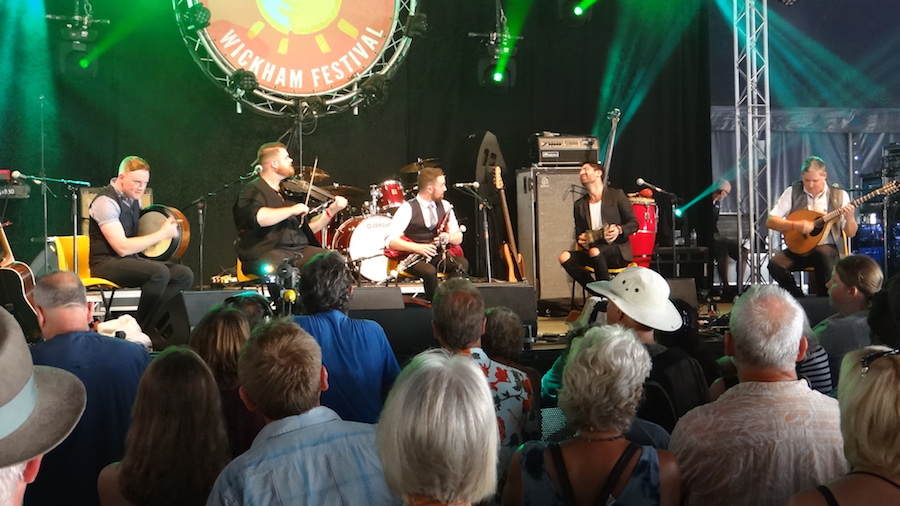
Ímar
After Ímar’s set, The Valley Stage programme switched from folk to pop with The South and Steve Harley and Cockney Rebel. But back on The Village Stage roots music continued, first with Mad Dog Mcrea expertly creating their trademark folk-rock party atmosphere and then The Dhol Foundation rounding the evening off. Their drum rhythms ensure that few in the audience keep still during a Dhol gig and Johnny Kalsi is a past-master at enticing people to try a few Indian dance moves. It wasn’t long before the tent, and surrounding grounds resembled a Bollywood dance scene. That was quite an opening night, and there were three full days of music still to come.
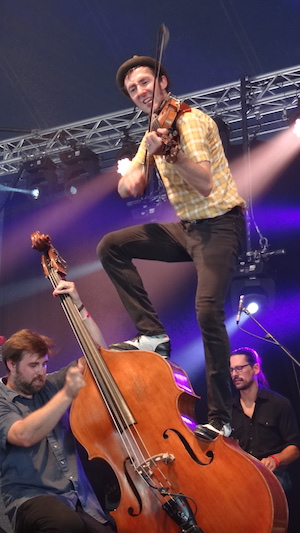
The East Pointers is a band that, superficially, is cut from the same cloth. Still plenty of energy in their stage performance, especially with their instrumental sets, their songwriting, though, takes a more prominent rôle. They are two brothers, Tim (fiddle, vocals) and Koady Chaisson (banjo) with guitarist Jake Charron who also turns his hand to keyboards and jaw harp. Their tune writing draws heavily on the Celtic tradition that was part of their upbringing, whilst the stories told in their songs are very much concerned with present-day life on a remote east Canadian island. I’ve long harboured an ambition to visit that part of Canada, listening to these three PEI bands might just have brought it a step or two nearer.
Scottish bands were even more numerous than the Canadians and, when it came to giving seriously upbeat, immensely enjoyable performances, they were every bit as capable as their Celtic cousins. Mohsen Amini played his second gig of the weekend with Talisk, the trio which won the BBC2 Young Folk Award in 2015 and has been garnering more awards pretty much ever since. Graeme Armstrong joined Mohsen and fiddler Hayley Keenen last summer, replacing original guitarist Craig Irving who’s moved on to Manran. Graeme is now well established with the trio, his guitar rhythms providing the backbone to the interplay and solos of concertina and fiddle. The combination is working better than ever, their set packing out the Village Stage tent. There’s a new album (titled Beyond) ready for release in October which Mohsen described as “more thoughtful, more progressive” and, as a departure from the strictly trio set up, will feature string arrangements from Greg Lawson.
One Scottish band I was seeing for the first time, Hò-Rò, have grown from a four to six-piece outfit since they burst on the scene winning the Danny Kyle award at 2014’s Celtic Connections and then voted Up & Coming Artist of the Year at last year’s MG Alba Scots Trad Music Awards. Their array of instruments is impressive, highland and border pipes, fiddle, accordion and whistles are the lead instruments and guitar, drums, keyboards and bodhrán provide texture and rhythm. It’s good that, increasingly, one sees female faces in the emerging, Scottish bands. Fiddler Lucy Doogan adds vocals to Hò-Rò’s sound palette, her fiddle and voice major components of the band’s sound. Piano accordion is also a prominent part of many arrangements and, for Wickham, as Calum MacPhail was unable to make the gig, Stephen Drummond deputised at short notice and gave an impressive performance. Hò-Rò is now very definitely on my list of bands to keep a careful eye on.
Skipinnish, in contrast, is already an established festival headliner, two consecutive years at Shrewsbury Festival are a testament to that. And Wickham was confident enough of their popularity to programme them in the same time slot as Show of Hands. So, for the final 75 minutes on Saturday night, both main stage tents were overflowing with enthusiastic crowds. This was the furthest south Skipinnish had ventured in the UK, and they came with the full eight-piece band including a new bass player. Andrew Tikka has been on bass for the last couple of years, but with his departure for a new job in China, Charlotte Printer has taken over. The band delivered exactly what was needed for the closing set on a summer night, plenty of tune sets to keep the crowd bouncing, separated by outstanding songs, some with irresistible choruses, others telling memorable stories of Highland and Island life, past and present.
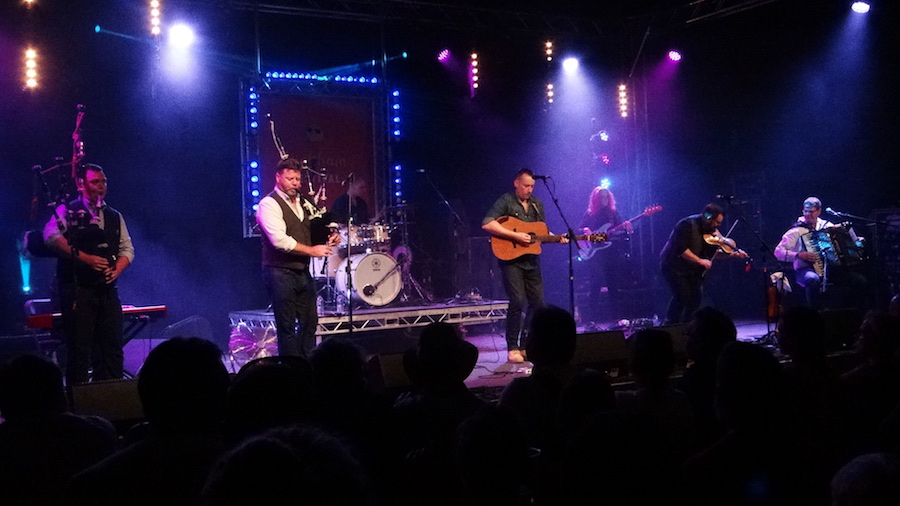
Skipinnish
You need to have a heart of stone to be unmoved when all eight of Skipinnish are at full throttle with both sets of highland pipes. In stark contrast, Saltfishforty, as a duo, can’t rely on the weight of numbers but still have a foolproof technique for grabbing people’s attention. Maybe it’s those gentle Orkney accents; you just can’t ignore them. But then the humour of their chat grabs you and all this before they play a note. When they do, Brian’s mandola and Douglas’ fiddle weave a musical web that’s so entertaining you’ll be rooted to the spot.
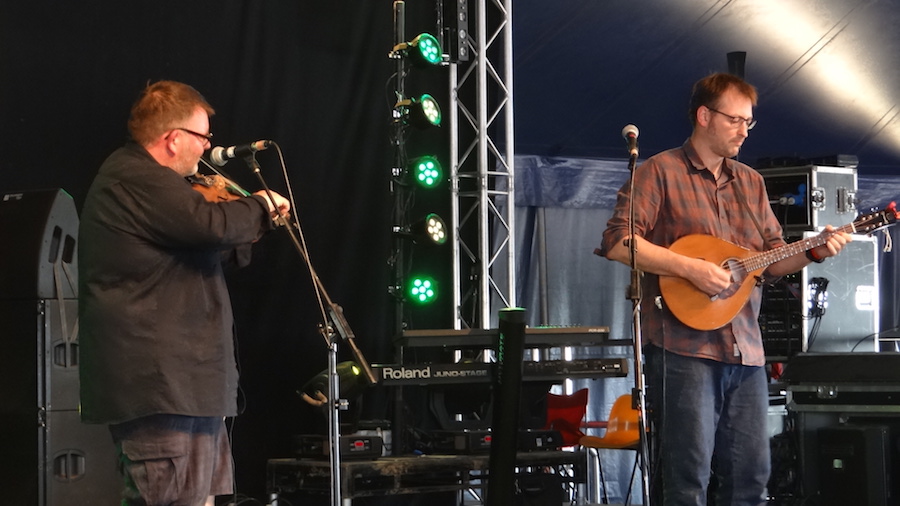
Saltfishforty
A Scottish band of a rather different style took to the Valley Stage on Sunday afternoon. Ten years ago, established folk artists Kris Drever and John McCusker joined with Indie rock vocalist Roddy Woomble to write and record an album, Before the Ruin. This year, Celtic Connections suggested they should reconvene to mark the anniversary. Having done it once, it seemed a good idea to do it a few more times. But, says Kris, there are no plans for any new material. For Wickham, their line-up included Louis Abbott from Admiral Fallow. Naturally, Roddy took lead vocal for most of the set and in characteristic style wandered the stage, heading to the back during instrumental passages. Rôles were reversed with Kris taking over the vocal for The Poorest Company, a song that has stayed in his own repertoire over the years. It’s so typical of Wickham Festival to drop unexpected treats such as this into the programme.
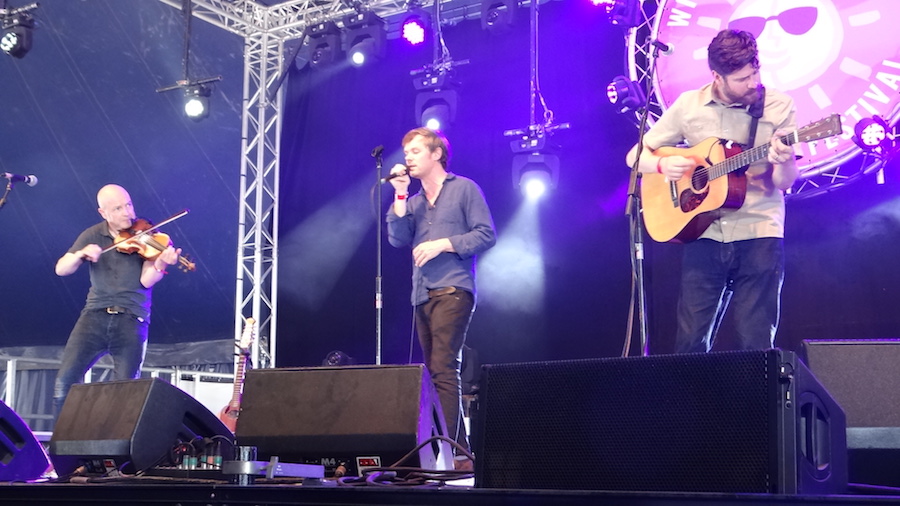
Dreever, McCusker and Woomble
There were fewer Irish musicians in the programme this year, and in truth, Flook is only partly Irish. There haven’t been many opportunities to see them in recent years, so their appearance was particularly welcome. A flute, a whistle, a guitar and a bodhrán is not the most obvious of instrument combinations but in the hands of Brian Finnegan, Sarah Allen, Ed Boyd and John Joe Kelly the result is magical, and they weaved that magic to perfection. Great news from Brian is that a new Flook album is almost ready, look out for a release date early next year.
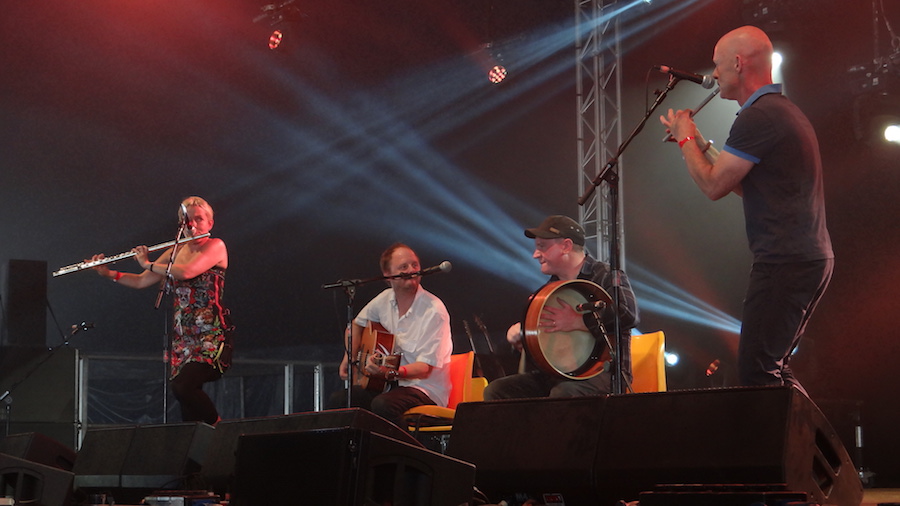
Flook
Daoirí Farrell is 100% Irish, as asserted on his current album, True Born Irishman. He says a third album is almost finished if only he could find time to get back into the studio in between all the festivals he’s playing this summer. He’s not complaining, mind; he’s still riding a roller coaster of popularity that shows no sign of slowing down. His Wickham set was a perfect illustration of why, a relaxed easy-going stage presence, entertaining introductions to the songs, a singing voice that can melt the heart or put fire in your belly, all accompanied on his treasured bouzouki. He really is the complete entertainer.
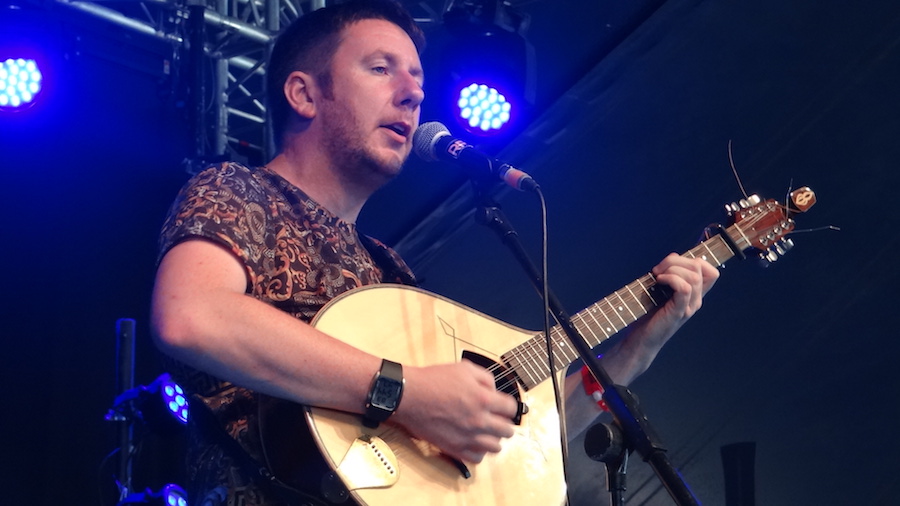
Daoirí Farrell
As for the remaining home nations, Wales was well represented by Martyn Joseph (see part 1) and also Allan Yn Y Fan. Unfortunately, their appearance clashed with that of Bella Gaffney and Polly Bolton on the Valley Stage so, I had to choose, Wales or England? Bella and Polly, both from Yorkshire, have been playing as a duo for less than a year. Bella’s previous solo work mixed her own and traditional songs while Polly played bluegrass and old-time with the trio Stillhouse. A back-stage jam first brought them together, both recognising a natural chemistry that was worth developing. At Wickham, they were joined by cellist Sarah Smart who is becoming the third ingredient of a fascinating mix. Her cello, whether bowed or plucked and percussive is a perfect foil to Polly’s mandolin or banjo and all three voices blend and harmonise beautifully. The mix of styles offers so much promise, consider a set that can move from trad. bluegrass with Cornbread and Butterbeans, to Polly’s version of Polly on the Shore, no, not the trad song but the Coope, Boyes and Simpson composition. This is then mixed with John Kirkpatrick’s Fairies on Acid and moves on to the jig, Zelda. There’s more to come as well, this autumn the trio is expanding to a quartet with the addition of fiddler, Holly Brandon. I’m really looking forward to hearing that, but, please, think of a band name before I have to write about Gaffney, Bolton, Smart and Brandon.
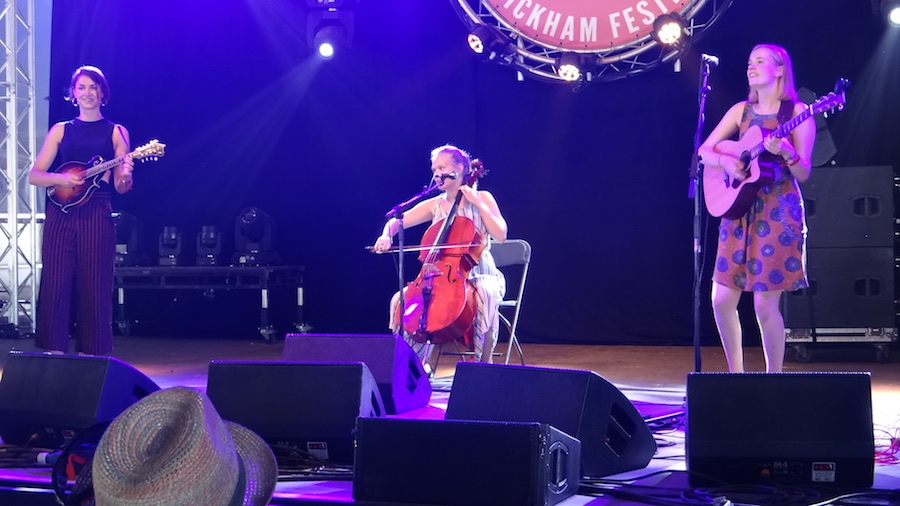
(L-R) Polly Bolton, Sarah Smart and Bella Gaffney
Of the tried and tested festival favourites, Show of Hands can be relied upon to produce a fresh festival set each summer that satisfies both established fans and attracts more converts.
Similarly, Kate Rusby’s festival appearances this summer will have delighted her many fans. Having toured the UK extensively as a solo artist last summer, Richard Thompson was back this year with his Electric Trio, Taras Prodaniuk on bass and Michael Jerome on drums. Their set seamlessly mixed new material with established classics including a rare outing for one of Richard’s earliest songs, the Cropredy anthem, Meet on the Ledge. Richard is rightly lorded as one of the greatest guitarists but the musicianship of the whole trio is truly breathtaking, they’ll be back in the UK in October touring the latest album, 13 Rivers, unmissable.
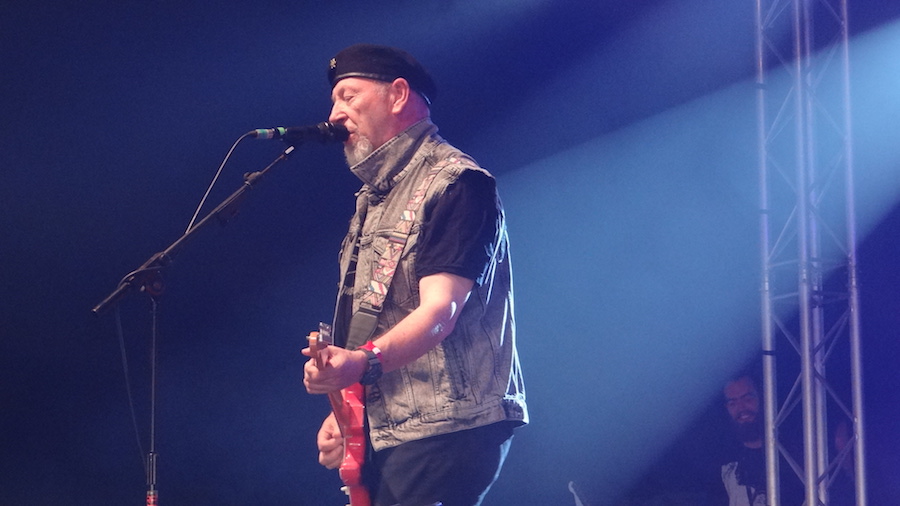
Richard Thompson
Having called time on Bellowhead, Jon Boden spent much of the last year touring as a solo performer, but it would seem that the lure of a big band is hard to resist. The Remnant Kings are ten strong and include a string section of fiddles, viola and cello and a brass section of flugelhorn and euphonium. It will be interesting to see how, as they develop and mature as a band, they build their own distinct style and repertoire.
Wickham festival had one of its best lineups this year, that, combined with the glorious weather, guaranteed success. Four days of top-class music, thank you, Wickham.


